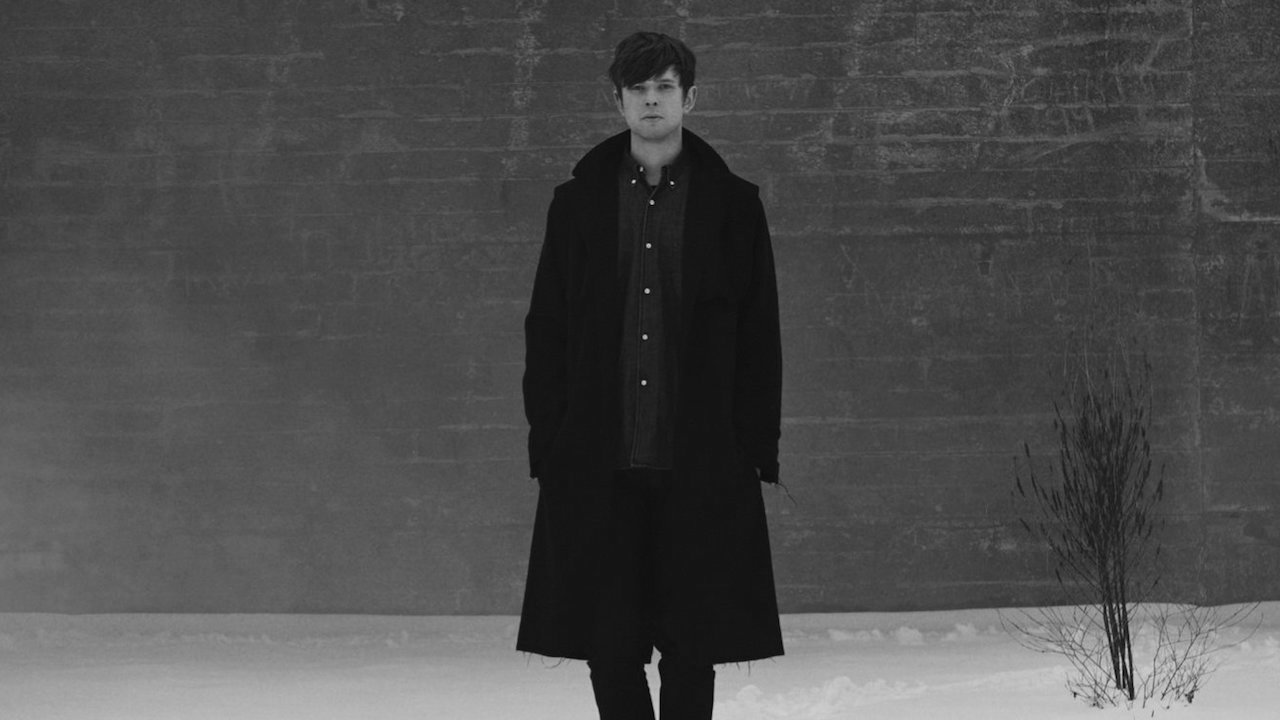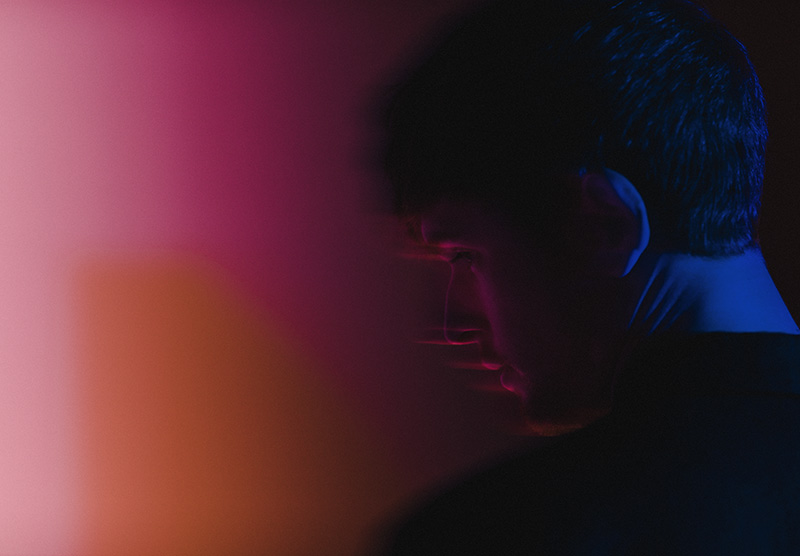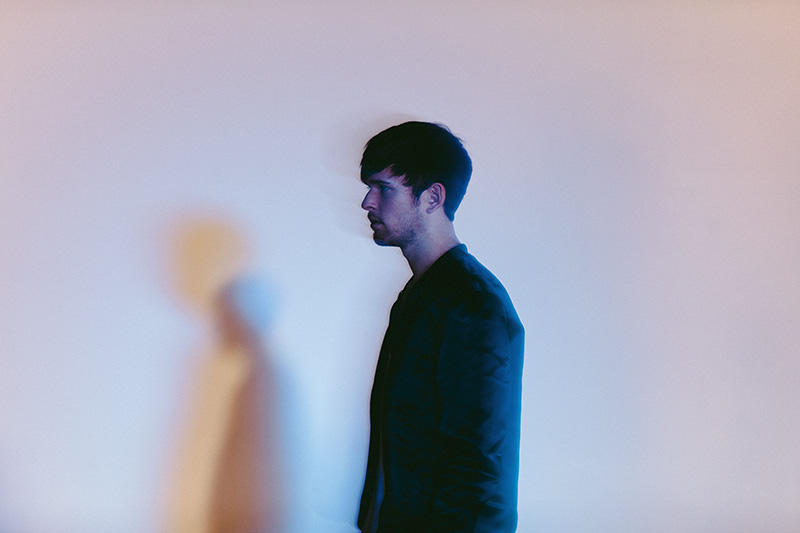It’s easy to understand where James Blake gets his reputation.
In the six years since his career took off with a major label deal, the British songwriter has become a master of his own style of melancholy, dub-inflected songwriting. His distinct falsetto—first used sparingly amid mysterious electronic tracks, now an inimitable hallmark of his sound—is often warped with reverb and digitization to sound hauntingly lonely, or robotic, or whatever else his meticulously assembled elegies call for. After two critically acclaimed albums’ worth of this, a Mercury Prize, Brit and Grammy nominations, and hundreds of worldwide tour dates, it makes sense that he’s now known as one of music’s most somber sad boys. He gets the same jokes that follow Bon Iver’s Justin Vernon around—you know, the ones that suggest they’re actually magical woodland creatures. (No wonder the two men are now close friends and collaborators.) Blake knows his stone-faced public demeanor—or his phantom forest music videos—hasn’t done much to dispel that image, either.
“There are a lot things I thought I was—and that maybe I tried to portray myself as being—and one of those things was ‘serious,’” the 27-year-old says, emphasizing that last word dismissively, like he no longer believes it even exists. “That wasn’t me.”
It’s the middle of April, and Blake is sitting in the afternoon sunshine on a restaurant deck at the end of the Malibu Pier. Wearing a mint-colored floral shirt with birds on it, eating salad and drinking iced coffee, and making dry jokes about the toddlers screaming at the next table, he looks like a man who is perfectly comfortable out in the open, among humans. With his small, round, iridescent sunglasses—a pair that can only be described as “groovy”—he might even seem a little goofy if his tallness didn’t also give him an air of unflappability. Based on appearances, it seems like much has changed in the three years since his last album, 2013’s Overgrown.
During that time, Blake has shared studio time with a cornucopia of top-tier talent: Vernon, Kanye West, Drake, Vince Staples, Rick Rubin, and even the elusive Frank Ocean. And Rubin’s Shangri-La Studios here in Malibu was the birthplace of a good chunk of his new album, The Colour in Anything. Blake says the record is the result of some of the healthiest, most productive years of his adult life. His relaxed attitude today is as new to him as it is to me, and he’s eager to dissect the changes he’s undergone.
“For this record, I just decided that I was going to let people in and allow help,” he says of Colour, which features guest spots from Vernon and psychedelic New Zealander Connan Mockasin, as well as songwriting contributions from Ocean and production from Rubin. It still features the singer’s signature harmonies—those poignant tributes to broken relationships and life in the modern era—while adding more acoustic piano improvisations and introspection. Some songs have him sounding more blatantly heartbroken than ever, and it’s hard to miss the naked woman drawn into the gnarled branches of the album’s illustrated cover. But despite being 75 minutes long—nearly twice the size of Overgrown—the record also feels less obsessed-over. This loose quality is perhaps thanks in part to his newfound openness to collaboration and assistance.
After spending nearly his entire adult life in the spotlight, he’s been making a conscious effort to keep everything in perspective, to get out of his own head and live a normal existence. Whether in the studio with Ocean (who he names as Colour’s biggest influence) or Staples (for whom he’s been producing beats), or back in the outside world catching up on lapsed friendships, Blake has spent the last three years consciously removing himself from the dark, moody hole he dug for himself following his instant success.
And if you believe in karma, you might say this personal evolution has rewarded him: Colour arrives directly after his appearance on Lemonade, Beyoncé’s latest world-stopping pop gambit. In addition to helping pen the record’s opening track, he also co-wrote and sang on the song “Forward,” which shows up at the visual album’s most sobering stretch, as images of the mothers of Eric Garner, Trayvon Martin and Michael Brown—each holding a photo of her late son—flash across the screen. Blake has now arrived at a moment in his career where his music resonates powerfully enough to soundtrack the cultural moments of the biggest stars on Earth. And he’s never seen more clearly.
Pitchfork: How did the Lemonade feature go down?
James Blake: Beyoncé came to the studio, and I was sitting at the piano when I met her. She was just lovely. I came up with something to go with an idea she had; I just embellished her melody. I think the idea was to use some of her lyrics, but I didn’t realize that—I misunderstood and did something entirely different from what she wanted. But it didn’t matter, because she really liked it, and they ended up using [my version]. Blue Ivy was there, too, which was nice. She was singing along to the song, which was a huge compliment, because kids just don’t have any pretense whatsoever.
Had you been in touch with Beyoncé’s people for a while before you actually did the song?
Not for that long. She has very nice people working with her. To be honest, in that world of very, very high-profile musicians and artists, it’s quite rare to have a personal touch, because by that point it’s kind of a well-oiled machine and sometimes experiences like that can be quite sterile. I enjoy working with somebody that collaborates in the traditional sense, where you actually sit down and make music. I was worried a little bit that it wouldn’t be like that, but I was working with material that she’d made and collaborating with it. Getting to chat with her about it was really nice. I guess that’s as good as it gets with somebody as brilliant as her. With somebody at that level, you can never really be sure, just because there’s so many people involved in a record, but she’s such an accomplished writer and singer.
Did you have any idea where or how your song would fit into the album or film?
None at all. I was pleasantly surprised to find that my song came in at the point that it did, and that she harmonizes with me for a brief moment. The first time I heard that, I got chills. And I found the way it’s used in the film really moving, seeing the mothers holding up pictures of their sons that have been killed via police brutality. I was honored.
What has the reaction been like for you? Were people in your life surprised?
Yeah. It just shows you the reach that she has—I had cousins of cousins ringing me. I really hadn’t expected it. It’s just really flattering.
Was that a coincidence that it came out so close to your own album?
Yeah, it really wasn’t planned. I wasn’t sure when she was going to release anything. But it’s very good timing, indeed.
How do you view The Colour in Anything in comparison to your previous work?
It’s bigger in scope and a byproduct of a lot of change and growing up, really, a lot of self improvement and reflection. My relationship was a catalyst for those kinds of changes; the person I’ve been with for the past year or so really brilliantly held up a mirror to me. I mean, I grew up an only child, and then at 21 I became quite famous—you’re in a petri dish, and people are just peering in on your progress. I feel now as if I can identify with more empathy and relate to people.
You’ve caught up?
I think that’s what it is. A lot of what I’m talking about is very normal for everyone else, because they grew up with brothers and sisters, or have had a very active social life. But I think musicians and artists especially risk falling away from the normal growth. I realized there was something worth saving and fighting for, and that meant looking at myself. It’s been really great in the long run, but it was painful.
This record is more expansive that your last, in both the variety of styles you’re playing with and in terms of length. Did you set out to make a more ambitious album this time?
No, it was weird. When you’re living an unstructured life, you can quickly develop self-doubt. You haven’t learned the same mechanisms for keeping yourself busy or active, and I slipped into a habit of being quite unproductive. I was making music, but I did all kinds of procrastination, trying to live a normal life, basically. I needed to improve my headspace, so I spent a year trying to improve my mental state. And then, just by doing that, I ended up writing a lot of the best music on the record.
You mentioned you were more open to collaboration this time around as well.
In the middle of recording, I felt like I wasn’t going to finish this record if I didn’t get some help and start working with other people. Making a record on your laptop is not the most stimulating process socially. You can really fall into the sinkhole if you’re not careful. So I thought, Fuck this, I’m going to spend time with other engineers. The idea came from working with Frank [Ocean], who was a huge inspiration for this record: his process, the way he writes, the strength of what he does, who he is. We became very good friends.
When I was working on some of his music early on, there was this chord progression I didn’t like in something that we were making, and I had an idea. A producer was in the room when I was coming up with it, and he was like, “Nah, I think the chords are fine.” I was like, “No, no.” Then he basically said, “This is Frank’s music.” And that’s exactly what I hadn’t learned by working on my own all these years; it’s the first lesson in producing, to let go. Frank’s vision was the only thing that mattered, at the end of the day. If the tables were turned, and Frank were to have a particular opinion about my music, I would take it into consideration, but it’s about my gut feeling as well. But learning from that made me want to work with other people on my own projects.
But you’re also saying this Frank Ocean record going to be worth the wait, right?
Yes, from what I know. It may be subject to change. He is onto something, he really is.
How did your approach change on this album, musically speaking?
I explored sitting at the piano and singing a lot more. I would talk with Justin Vernon, who is a great producer—a lot of people may not know that about him. He’s a good person to talk to. Much like Rick [Rubin], actually. Justin is an incredibly warm man. We’ve become really good friends. When I first met him, it felt like we had been separated somewhere down the line and were meeting each other again. It was a very strange feeling. In the studio, he would say things like, “Oh man, I love the chords in that track,” and that gave me so much confidence. Singing standing up at a mic with someone else recording was new, too; there never was any time to set up properly before.
You once talked about working with Kanye, but he’s not on the record. Did it not work out?
Something was supposed to happen; I don’t really know how to describe how that didn’t work out. I wanted Kanye to be on the song “Timeless,” but the verse didn’t materialize. I think a huge swath of things happened in his life, and I just stayed out of it. Eventually, the mood of the album changed, and in the end I don’t think it would have fit. But I didn’t say I was working with Kanye just so people would get interested—I really wanted him to be on it.
Did you actually meet up?
Yes, it was hilarious, because I’m just not used to the kind of environment [he lives in]. So he tells me, “Let’s meet in the Hidden Hills.” I’ve never been there—it’s almost like a celebrity resort, with a gate and everything. That was one of the most frantic car rides of my life. I had put “Hidden Hills” in the [GPS] and ended up in a farm somewhere. And I remembered some experiences I’ve had with people in America being late and kind of unreliable, and I thought, Man, if Kanye’s late for me, it’s not going to happen.
And then you were late?
I was two hours late. I got there and was like, “I am so sorry.” I was frantic. But he was so cool about it. Really lovely. So, you know, socially, it worked out in the end. It just didn’t yield any music. And that’s OK.
You have a reputation for making melancholy music. Were you trying to get away from that this time?
I listened to my old music and I really didn’t sound like a happy person. It was surprising to find out that I had been fairly unhappy that whole time, and people close to me may not have noticed. I’m not saying I didn’t enjoy anything, but those first four years of my career—I’m not sure I remember as much of it that I would like to, in vivid technicolor. Some of it is grayed out. I realized that [when it comes to making music], it wasn’t important whether I was happy or sad—it’s about sensitivity and your reaction to the world. I wouldn’t want to be one of those artists that keeps themselves in a perpetual cycle of anxiety and depression just to extract music from that.
It’s a toxic way to live.
Totally. With my first two records, as much as I see music I’m very proud of, I also see a headspace I don’t want to be in anymore. I’m happy to be sitting out here really enjoying it. It’s all in color.
Has your relationship with people in your life changed as well?
Yeah. What I’ve noticed is, when people see you become famous, they stop asking you how you are—really, deeply, how you are, not just, “How’s the career going?” I mean, “Are you all right?” Because they assume you are. And they stop telling you what happened on their weekend. So it takes a little bit of work to get people to remember that you do really care; just because I went to Brian Eno’s house for tea doesn’t mean that I don’t want to know what happened when you went clubbing on Friday night.
I’m not a dubstep person—
Neither am I.
But do you think making music in that world lends itself to more doom and gloom?
Absolutely. It was so funny, when I was making music like that, I heard a lot of people saying, “Oh, I can’t really dance to this, it doesn’t have any melodies.” At the time, I was like, “What are you talking about? This is the perfect expression of everything I’m feeling at the moment.” But I now understand why they were saying that. Now I kind of get it.
This article was found on pitchfork.com




